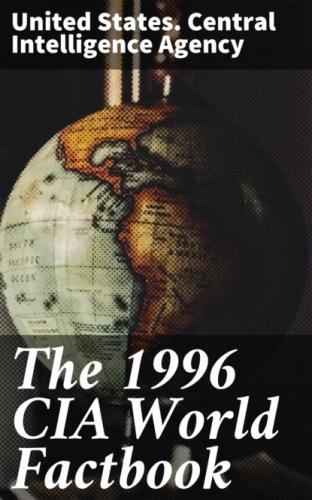Protocol, Antarctic Treaty, Biodiversity, Climate Change, Endangered
Species, Environmental Modification, Hazardous Wastes, Marine
Dumping, Nuclear Test Ban, Ozone Layer Protection, Ship Pollution,
Wetlands; signed, but not ratified - Desertification, Law of the Sea
Geographic note: strategic location relative to sea lanes between
Atlantic and Pacific Oceans (Strait of Magellan, Beagle Channel,
Drake Passage); Atacama Desert is one of world's driest regions
People———
Population: 14,333,258 (July 1996 est.)
Age structure:
0–14 years: 29% (male 2,071,816; female 2,041,417)
15–64 years: 65% (male 4,599,173; female 4,651,030)
65 years and over: 6% (male 403,019; female 566,803) (July 1996 est.)
Population growth rate: 1.24% (1996 est.)
Birth rate: 18.09 births/1,000 population (1996 est.)
Death rate: 5.68 deaths/1,000 population (1996 est.)
Net migration rate: 0 migrant(s)/1,000 population (1996 est.)
Sex ratio:
at birth: 1 male(s)/female
under 15 years: 1.02 male(s)/female
15–64 years: 0.99 male(s)/female
65 years and over: 0.71 male(s)/female
all ages: 0.97 male(s)/female (1996 est.)
Infant mortality rate: 13.6 deaths/1,000 live births (1996 est.)
Life expectancy at birth: total population: 74.49 years male: 71.26 years female: 77.72 years (1996 est.)
Total fertility rate: 2.23 children born/woman (1996 est.)
Nationality: noun: Chilean(s) adjective: Chilean
Ethnic divisions: European and European-Indian 95%, Indian 3%, other 2%
Religions: Roman Catholic 89%, Protestant 11%, Jewish
Languages: Spanish
Literacy: age 15 and over can read and write (1995 est.)
total population: 95.2%
male: 95.4%
female: 95%
Government—————
Name of country: conventional long form: Republic of Chile conventional short form: Chile local long form: Republica de Chile local short form: Chile
Data code: CI
Type of government: republic
Capital: Santiago
Administrative divisions: 13 regions (regiones, singular - region); Aisen del General Carlos Ibanez del Campo, Antofagasta, Araucania, Atacama, Bio-Bio, Coquimbo, Libertador General Bernardo O'Higgins, Los Lagos, Magallanes y de la Antartica Chilena, Maule, Region Metropolitana, Tarapaca, Valparaiso note: the US does not recognize claims to Antarctica
Independence: 18 September 1810 (from Spain)
National holiday: Independence Day, 18 September (1810)
Constitution: 11 September 1980, effective 11 March 1981; amended 30 July 1989
Legal system: based on Code of 1857 derived from Spanish law and subsequent codes influenced by French and Austrian law; judicial review of legislative acts in the Supreme Court; does not accept compulsory ICJ jurisdiction
Suffrage: 18 years of age; universal and compulsory
Executive branch:
chief of state and head of government: President Eduardo FREI
Ruiz-Tagle (since 11 March 1994) elected for a four-year term by
popular vote; election last held 11 December 1993 (next to be held
NA December 1997); results - Eduardo FREI Ruiz-Tagle (PDC) 58%,
Arturo ALESSANDRI 24.4%, other 17.6%
cabinet: Cabinet appointed by the president
Legislative branch: bicameral National Congress (Congreso Nacional) Senate (Senado): election last held 11 December 1993 (next to be held NA December 1997); results - percent of vote by party NA; seats - (46 total, 38 elected) Coalition of Parties for Democracy 21 (PDC 13, PS 4, PPD 3, PR 1), Union for the Progress of Chile 15 (RN 11, UDI 3, UCC 1), right-wing independents 10 Chamber of Deputies (Camara de Diputados): election last held 11 December 1993 (next to be held NA December 1997); results - Coalition of Parties for Democracy 53.95% (PDC 27.16%, PS 12.01%, PPD 11.82%, PR 2.96%), Union for the Progress of Chile 30.57% (RN 15.25%, UDI 12.13%, UCC 3.19%); seats - (120 total) Coalition of Parties for Democracy 70 (PDC 37, PPD 15, PR 2, PS 15, left-wing independent 1), Union for the Progress of Chile 47 (RN 30, UDI 15, UCC 2), right-wing independents 3
Judicial branch: Supreme Court (Corte Suprema), judges are appointed by the president, the president of the Supreme Court is elected by the 17-member court
Political parties and leaders: Coalition of Parties for Democracy
(CPD) consists mainly of: Christian Democratic Party (PDC),
Alejandro FOXLEY; Socialist Party (PS), Camilo ESCALONA; Party for
Democracy (PPD), Jorge SCHAULSOHN, Radical Party (PR); Union for the
Progress of Chile (UPP) consists mainly of three parties: National
Renewal (RN), Andres ALLAMAND; Independent Democratic Union (UDI),
Jovino NOVOA; Center Center Union (UCCP), Francisco Javier ERRAZURIZ
Other political or pressure groups: revitalized university student
federations at all major universities; labor - United Labor Central
(CUT) includes trade unionists from the country's five largest labor
confederations; Roman Catholic Church
International organization participation: APEC, CCC, ECLAC, FAO,
G-11, G-77, IADB, IAEA, IBRD, ICAO, ICFTU, ICRM, IDA, IFAD, IFC,
IFRCS, ILO, IMF, IMO, Inmarsat, Intelsat, Interpol, IOC, IOM, ISO,
ITU, LAES, LAIA, Mercosur (associate member), NAM, OAS, OPANAL, PCA,
RG, UN, UNCTAD, UNESCO, UNIDO, UNMOGIP, UNTSO, UNU, UPU, WCL, WFTU,
WHO, WIPO, WMO, WToO, WTrO
Diplomatic representation in US: chief of mission: Ambassador John BIEHL del Rio chancery: 1732 Massachusetts Avenue NW, Washington, DC 20036 telephone: [1] (202) 785–1746 FAX: [1] (202) 887–5579 consulate(s) general: Chicago, Houston, Los Angeles, Miami, New York, Philadelphia, San Francisco, and San Juan (Puerto Rico)
US diplomatic representation: chief of mission: Ambassador Gabriel GUERRA-MONDRAGON embassy: Avenida Andres Bello 2800, Santiago mailing address: use street address telephone: [56] (2) 232–2600 FAX: [56] (2) 330–3710
Flag: two equal horizontal bands of white (top) and red; there is a blue square the same height as the white band at the hoist-side end of the white band; the square bears a white five-pointed star in the center; design was based on the US flag
Economy———
Economic overview: Chile has a prosperous, essentially free market economy, with the degree of government intervention varying according to the philosophy of the different regimes. Under the center-left government of President AYLWIN, which took power in March 1990, spending on social welfare rose steadily. At the same time business investment, exports, and consumer spending also grew substantially. The new president, FREI, who took office in March 1994, has emphasized social spending even more. Growth in real GDP in 1991–95 has
